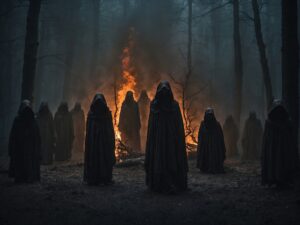In the realm of the mystical and the arcane, few topics are as simultaneously bewildering and captivating as the distinction between “magick” with a “k” and its more commonly seen counterpart, “magic.” As we embark on this esoteric journey, let’s unravel the tapestry of history, belief, and practice that differentiates these two fascinating concepts.
Introduction to Magick vs Magic
At first glance, the difference between “magick” and “magic” might seem like a trivial matter of spelling to the uninitiated. However, as we delve deeper, it becomes evident that this single letter heralds a world of difference in meaning, intent, and practice. This exploration is not merely an academic exercise. It is a key to understanding a vast and varied cultural phenomenon that stretches across the globe and deep into the annals of history.
The Historical Origins of Magick
The term “magick” with a “k” was popularized in the early 20th century by Aleister Crowley. A figure shrouded in controversy but undeniably influential in the realms of occultism and ceremonial magick. Crowley introduced this spelling to differentiate the spiritual and ritualistic practices he advocated from the stage magic performed by illusionists and entertainers. This distinction was crucial for Crowley and his followers, as it underscored the seriousness and depth of their pursuits in contrast to mere sleight of hand.
The roots of magick, however, stretch far beyond Crowley’s relatively modern rebranding. Ancient civilizations across the world practiced forms of magick as a means of interacting with the divine, influencing the natural world, and navigating the spiritual realms. From the shamanistic rituals of prehistoric societies to the elaborate ceremonies of ancient Egypt and Babylonia, magick has always been an integral part of the human experience, intertwining with religion, science, and philosophy.
Defining Magick: What is the Difference?
So, what precisely is the difference between “magick” and “magic”? At its core, the distinction lies in purpose and perception. “Magic,” in its most common usage, refers to the art of illusion and entertainment. Think card tricks, disappearing acts, and the classic rabbit out of a hat. It’s a craft that relies on skill, misdirection, and sometimes technology. This craft creates a sense of wonder and disbelief among audiences.
“Magick,” on the other hand, is steeped in the spiritual and the mystical. It’s an esoteric practice that encompasses a wide range of activities, including but not limited to spellcasting, divination, and the invocation of deities or spirits. Practitioners of magick often seek to tap into hidden realms and powers to bring about change in the physical world or achieve personal transformation. This form of magick is considered a serious discipline, requiring study, dedication, and a profound understanding of the forces at work.
The Spiritual and Mystical Aspects of Magick
Delving into the spiritual dimensions of magick reveals a landscape rich with symbolism, ritual, and profound personal significance. For many, magick serves as a path to enlightenment. A way to connect with the divine or with aspects of the self that lie buried beneath the surface of everyday consciousness. Through rituals and ceremonies, practitioners aim to align themselves with cosmic forces, harnessing energies that can influence their lives and surroundings in tangible ways.
This spiritual pursuit often involves a deep dive into the mysteries of existence. Prompting questions about the nature of reality, the purpose of life, and the connectivity of all things. It’s a journey that can be transformative, leading individuals to discover hidden strengths. Helping them overcome personal obstacles and achieve a sense of harmony with the universe.
 Magick in Different Cultures and Belief Systems
Magick in Different Cultures and Belief Systems
The practice of magick is as diverse as the cultures and belief systems from which it springs. Across the globe, magick takes on myriad forms, reflecting the values, traditions, and cosmologies of its practitioners. In the voodoo traditions of Haiti and New Orleans, magick is intimately connected with ancestral spirits and the loa, powerful entities who can be petitioned for guidance and assistance. In the Nordic countries, the ancient runes offer both a system of writing and a means of divination and magickal work. Thus linking the practitioner to the mythic past and the powers it holds.
In many indigenous cultures, magick is inseparable from the natural world, with practices centered around the elements, animal spirits, and the land itself. These traditions emphasize the interconnectedness of all life and the importance of living in harmony with nature. In contrast, the ceremonial magick of the Western esoteric tradition often focuses on the invocation of angels, demons, and other spiritual entities, drawing on a complex body of lore that includes alchemy, astrology, and the Kabbalah.
The Practice of Magick: Spells, Rituals, and Ceremonies
At the heart of magickal practice are the spells, rituals, and ceremonies through which practitioners seek to effect change. These can range from simple spells cast with a few candles and incantations to elaborate ceremonies requiring precise timing, specific tools, and the participation of multiple individuals. Regardless of complexity, all magickal workings are grounded in intention. The clear and focused will of the practitioner is considered the driving force behind the magick.
Rituals often involve the use of symbols, words of power, and physical actions that are believed to resonate with certain energies or entities. The preparation for these rituals can be as important as the rituals themselves, with practitioners cleansing themselves and their spaces, gathering materials, and entering into a meditative or trance state to align their minds with their intentions.
Magick in Popular Culture and Media
In recent years, magick has experienced a resurgence in popularity, thanks in part to its portrayal in popular culture and media. Movies, television shows, and books have introduced audiences to the concept of magick as a force for change, adventure, and self-discovery. While these portrayals can sometimes veer into the realm of fantasy, they also reflect a growing interest in alternative spiritualities and the mystical aspects of life.
This fascination with magick has led to a broader acceptance and exploration of magickal practices, with more people than ever seeking to incorporate elements of magick into their daily lives. Whether through mindfulness, meditation, or the casting of simple spells, individuals are finding ways to tap into the power of magick to enhance their personal growth and well-being.
Debunking Misconceptions about Magick
Despite its increasing visibility, magick remains shrouded in misconceptions and stereotypes. Many still associate magickal practices with dark forces, nefarious intentions, or supernatural dangers. However, at its core, magick is about connection — with oneself, with the natural world, and with the vast, unseen forces that govern the universe. Like any tool, magick can be used for harm or for healing, but its essence is neutral. It is the intent of the practitioner that determines the nature and outcome of the magickal work.
Another common misconception is that magick is a quick fix for life’s problems. In reality, magick requires patience, discipline, and a willingness to engage in self-reflection and personal development. The changes it brings about are often subtle and gradual, requiring practitioners to be active participants in their own transformation.
Exploring the Impact of Magick on Personal Transformation 
For those who walk the path of magick, the journey is often marked by profound personal transformation. Magick challenges practitioners to confront their fears, examine their desires, and transcend their limitations. It encourages a deep engagement with the mysteries of existence, fostering a sense of wonder, curiosity, and respect for the unknown.
Through the practice of magick, individuals can develop a greater sense of agency and empowerment, learning to shape their reality in accordance with their will and vision. This process of becoming can be life-changing, leading to greater self-awareness, confidence, and a deeper connection to the world around them.
Embracing the Power of Magick
As we conclude our exploration of magick vs magick, it’s clear that this ancient practice offers a rich and complex path for those seeking to engage with the deeper aspects of life. Whether through the rituals of high magick or the simple spells of everyday witchcraft, magick invites us to imagine a world where the impossible becomes possible, where the unseen forces that shape our existence can be harnessed and directed toward our highest good.
Embracing the power of magick requires an open mind, a willing heart, and a spirit of adventure. It’s a journey that can transform not only the individual practitioner but the world itself, as more people awaken to the magick within and around them. For those ready to embark on this journey, the path of magick awaits, offering endless possibilities for discovery, empowerment, and change.
The Article Magick vs Magic: Unraveling the Spellbinding Distinction First Appeared ON
: https://ad4sc.com
The Article Magick vs Magic: Unraveling the Spellbinding Distinction Was Found On https://limitsofstrategy.com



No responses yet